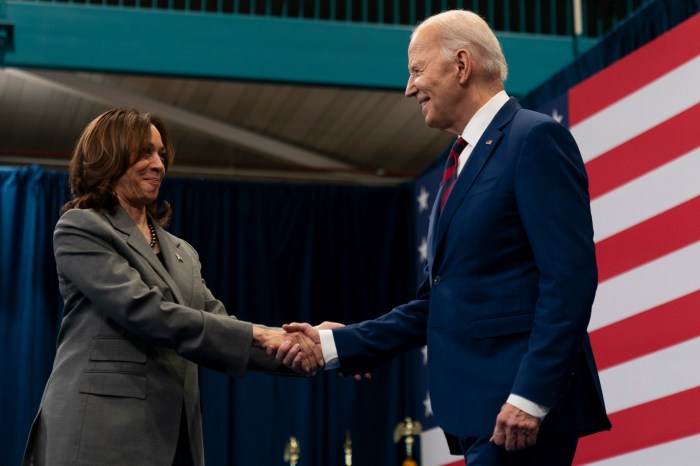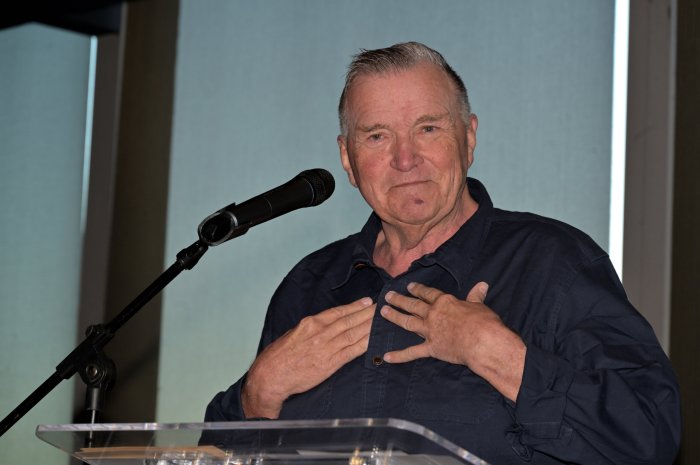“All human beings ought to be protected equally,” Michael R. Long, the chairman of the New York State Conservative Party, said. “You don't need special legislation to legitimize a lifestyle, and that's what this is about… Once they kick the door open, they're going to be back for gay marriages.”
Long –– for more than two decades the leader of the small, though at times influential, third party –– made those comments to the New York Sun in December 2002 after 12 State Senate Republicans joined 22 Democrats to pass the Sexual Orientation Non-Discrimination Act (SONDA), New York’s gay rights law.
Eleven of those 12 Republicans had also been endorsed by Long’s Conservative Party.
On that occasion and numerous others (including in October 2002 comments to the Sun and a May 2001 statement to the New York Times), Long threatened to deny his party’s ballot line from –– and mount Republican Party primary challenges against –– GOP senators who voted for SONDA.
''It wouldn't be the first time we have challenged candidates,'' Long told the Times, according to a May 20, 2001 article.
Yet, when state senators next faced the voters, in the fall of 2004, Long’s party challenged none of the eight Republican-Conservative SONDA supporters who sought reelection and gave its endorsement to seven of them.
Only Republican Majority Leader Joseph Bruno among the eight was denied the Conservative Party line in the November election that year –– but he faced no opponents from any party, in any event.
Long apparently also decided to punish Bruno’s deputy Dean Skelos, who is now the Senate Majority leader, despite the fact that the Long Island Republican voted against SONDA. With no Conservative on the ballot, Skelos rolled over his Democratic opponent by a nearly two-to-one margin.
Long’s stern warnings about SONDA coupled with the Conservative Party’s lack of follow-through in the next election cycle are certainly worth bearing in mind as marriage equality advocates head into what they hope is the final stretch of the battle to achieve victory in the State Senate prior to legislative adjournment in late June.
In an April 22 Wall Street Journal article, Long, who at press time had not responded to Gay City News’ request for comment, was quoted saying, “I feel very strongly that we will prevail. We consider it a line in the sand and very detrimental to a legislator if he or she votes to destroy marriage as we know it.”
The statement sounds very much like he is prepared to make the marriage equality vote a litmus test in future endorsements. If it is a litmus test, the question is whether it’s one that would motivate Long to oppose an offender’s reelection or merely not bestow on that incumbent the Conservative Party’s imprimatur.
Or does he have the room or will to do anything at all?
To be sure, the Conservative Party figures large in the calculations of many GOP senators. In 12 of the 32 Republican State Senate victories in 2010, votes earned on the GOP’s ballot line fellow below 50 percent. Those victors won their majorities by adding votes from the Conservative and Independence Party lines. In each case, the Conservative contribution was greater than the Independence share, often by a large margin.
Six of the seven freshman Republican senators first elected last year –– Lee M. Zeldin and Jack M. Martins on Long Island, Greg Ball from Putnam County, Patricia A. Ritchie from a district that hugs Lake Ontario and the St. Lawrence River, and Patrick M. Gallivan and Mark J. Grisanti from the Buffalo area –– fell between two and seven points under 50 percent on the GOP line.
Six incumbents –– Long Island’s Kemp Hannon, William Larkin, Jr. of Orange County, Stephen M. Saland of Dutchess County, John J. Bonacic of Ulster County, and Jim Alesi and Joseph Robach from the Rochester area –– also relied on votes from the Conservative and Independence lines to put them over the top. Hannon, Larkin, Saland, and Robach similarly depended on minor party support for their 2008 victories.
With 26 public supporters of marriage equality (all of them Democrats) out of the 32 needed and three of the four remaining Democrats potentially gettable despite their no votes in 2009, advocates need between three and six GOP votes to be assured of victory.
In the case of several Republicans who looked to Conservative support to ensure victory last November, we don’t need to ponder how their vote will be impacted. On April 26, Larkin made clear in comments to Gay City News that he will not support the marriage bill. Freshman Grisanti’s office also told the newspaper he would not vote for any measure with the word marriage in it, and according to a Ritchie staffer, that first-term senator “supports the traditional definition of marriage.”
How Conservative Party strength will play out in other districts remains very much an open question. Ball (who voted no while in the Assembly) and Alesi have both been publicly talked about as potential switches this year; their statements indicating they currently “don’t have a position” (Ball) or are “undeclared” (Alesi) have only fueled speculation about their intentions.
And of course, the remaining freshmen are, at least on paper, viable targets simply because they have never taken a public vote in opposition to marriage equality.
While certainly mindful of Long’s potential for mischief and mayhem, advocates point to numerous factors that might, in the end, render his opposition moot.
First, of course, is the history from SONDA. Ross Levi, executive director of the Empire State Pride Agenda, appears to view Long’s recent statement that he considers the question of marriage equality “a line in the sand and very detrimental to a legislator if he or she votes to destroy marriage as we know it” as falling short of his repeated warnings nearly a decade ago to run candidates against pro-SONDA Republican-Conservatives.
“We will be disappointed if the Conservative Party made a vote of conscience a litmus test for electoral support, particularly with polling showing majority support across the state on this issue,” he told Gay City News this week.
Both he and Brian Ellner, who heads up the Human Rights Campaign’s gay marriage push in New York, pointed to recent polls that have been consistent in showing support for the issue at 57 or 58 percent statewide, with healthy majorities across nearly all geographic, ethnic, religious, income, gender, and age lines.
A Siena Research Institute poll done April 4-6 found solid pro-equality majorities in the city, on Long Island, and upstate; and favorable margins among Independents at 61-34; Catholics, 59-35; and Latinos, 54-45. The African-American vote was essentially a draw, and Republicans opposed marriage equality by only a 48-45 margin. The only two demographic slices decisively rejecting the issue were conservatives (59-32) and Protestants (50-41) –– in one of the nation’s most heavily Catholic states.
Results from last year’s elections, advocates argue, show that standing for equal marriage rights has no discernible downside, while opposing it can hurt. Hundreds of thousands of dollars raised in the LGBT community were poured into races to defeat Republican Frank Padavan in Queens and Democrat William Stachowski in Buffalo, both of whom voted no when the marriage bill reached the Senate floor in December 2009 and were replaced by pro-equality Democrats, Tony Avella and Tim Kennedy, respectively.
Earlier in 2010, Democratic ex-Senator Hiram Monserrate, an anti-equality vote in 2009, lost his bid to regain the Queens seat he was expelled from after a domestic violence conviction to pro-marriage Assemblyman José Peralta, also with significant LGBT participation.
Meanwhile, the three pro-equality Democrats defeated in November –– Brian Foley and Craig Johnson on Long Island and Antoine Thompson in Buffalo –– lost races in which there is no evidence that vote played a role. In fact, nobody has even tried to make the case it did.
Both ESPA’s Levi and HRC’s Ellner delicately made the carrot and stick argument that follows from those results, saying the Padavan, Stachowski, and Monserrate losses were well-aimed shots across the bow.
“The LGBT community remains confident that we will be able to demonstrate the broad support for marriage equality across the state,” Levi said. “Particularly after the last election, every elected official in Albany is well aware that there is the strength in the LGBT community and among our allies to be used to support them or to be used against them.”
“I believe that a vote for marriage equality is a good vote for Republican senators,” Ellner said. “We intend to support those who vote for marriage equality, and of course the opposite is true.”
Ellner noted that soon after Maine GOP Senator Susan Collins played a pivotal 11th-hour role in reviving the prospects for what proved a successful Don’t Ask, Don’t Tell repeal drive last December, HRC sponsored a major fundraiser on her behalf.
Out gay Chelsea State Senator Tom Duane suggested that 2010 represented a high-water mark of sorts for the Conservative Party. In fact, two years earlier, the number of Republican wins in which the Conservative vote provided the margin of victory was eight versus the 12 last year.
“There was never any question that the opposition against our right to marry the ones we love is organized, powerful, and influential,” Duane said in an email message to Gay City News this week. “That said, 2010 saw a toxic alliance between the Tea Party, the Conservative Party, and Carl Paladino. New Yorkers are better than this truly unfortunate moment in New York’s political history.”
Taking on Long on his own home turf, Levi asserted, “We certainly believe that one can be a good conservative in New York State and be in favor of equality and justice.”
At least three current and former members of the Legislature would second that view. Joel Miller, a Dutchess County Republican who consistently gets the Conservative line as well, has voted for gay marriage on three occasions since 2007. Buffalo’s Tim Kennedy was elected to the Senate from Erie County last year on a pro-marriage equality platform with the blessing of the Conservatives, even though his Republican opponent pledged to vote no.
And veteran Republican Senator Nick Spano, who was an influential figure in Westchester County’s Conservative Party affairs, endorsed equal marriage rights in 2006. His political undoing was not the result of a Conservative revolt but rather his defeat at the hands of Democrat Andrea Stewart-Cousins, who also supports the issue.
The freedom of conscience Miller, Kennedy, and Spano enjoyed may in part be due to the limits on Long’s power in the state party –– his role is determinative only in those districts that cut across county lines. Districts wholly within an individual county –– as in the case of Miller, Kennedy, and Spano –– are controlled by local organizations that may or may not share Long’s keen interest in blocking gay rights advances.
Five of the Republicans for whom the Conservative Party line provided a critical assist last year –– Zeldin, Hannon, and Martins on Long Island and Alesi and Robach upstate –– share similar insulation from the party’s Long arm.
All that said, there clearly remain districts where potentially movable Republicans must weigh the importance of the Conservative Party’s support as well as make a judgment about whether it would in fact be withheld if they vote contrary to its edict. Marriage equality advocates there must marshal the best arguments for how, in a state where the consensus in favor of their issue has shown consistent and steady growth –– and will likely continue to do so over the next 18 months –– LGBT support is the more reliable political safe harbor.
With Long in the press these days less often about gay rights than about a property tax cap –– an issue with particular salience for the party’s county affiliates –– pro-marriage forces certainly have a credible case to make that their side will prove the more motivated in November 2012.

































